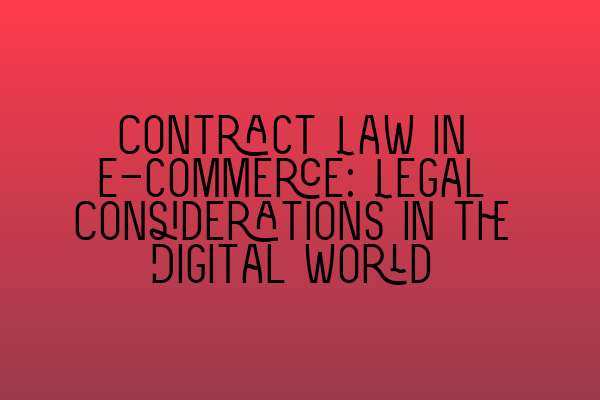Contract Law in E-commerce: Legal Considerations in the Digital World
As e-commerce continues to boom in the digital world, it is crucial for businesses to understand and comply with the legal considerations surrounding contract law. Contracts are the foundation of any business transaction, and the online environment presents unique challenges and opportunities. In this blog post, we will explore the key legal considerations that businesses need to keep in mind when engaging in e-commerce.
1. Offer and Acceptance
The formation of a contract in e-commerce begins with the offer and acceptance. Businesses must clearly communicate their offers on their websites or in other electronic communications. It is important to be precise and unambiguous in the terms and conditions presented to the customers. Clarity in the offer ensures that the customers are aware of their rights and obligations upon acceptance. On the other hand, customers accept the offer by taking specific actions such as clicking an “Accept” button or making a purchase.
For businesses, it is crucial to regularly review and update their terms and conditions to ensure they comply with legal requirements and best practices. Engaging a solicitor specializing in contract law can help businesses draft legally sound terms and conditions that protect their interests while complying with relevant regulations.
2. Consumer Protection Regulations
E-commerce businesses must comply with consumer protection regulations to maintain trust and transparency with their customers. Under the Consumer Rights Act 2015, consumers have certain rights, including the right to receive goods or services that meet the advertised description, the right to return faulty goods, and the right to receive a refund if goods/services are not provided as agreed.
By providing clear and comprehensive product descriptions, businesses can ensure that they fulfill their obligations under the law. Moreover, it is crucial to have a fair and transparent returns policy that outlines the process for returning faulty goods and obtaining refunds. This helps build trust with customers and demonstrates a commitment to consumer protection.
Businesses should also be mindful of data protection laws, such as the General Data Protection Regulation (GDPR), when collecting and processing customer data. Implementing robust data protection practices not only ensures compliance but also fosters customer trust.
3. Electronic Signatures
Contracts in the digital world often rely on electronic signatures. To ensure the validity of these signatures, businesses should understand and comply with the Electronic Communications Act 2000 and the eIDAS Regulation. These regulations establish the legal framework for the use of electronic signatures, ensuring their authenticity and integrity.
When incorporating electronic signatures into your e-commerce process, it is essential to use secure and reliable methods to verify the identity of the signatory. This helps protect businesses against fraud and ensures the enforceability of the contracts.
4. Dispute Resolution
Despite best efforts, disputes may arise in e-commerce transactions. It is important for businesses to have strategies in place to handle these disputes effectively. Consider incorporating alternative dispute resolution mechanisms, such as mediation or arbitration clauses, in your e-commerce contracts. These mechanisms can help resolve disputes quickly and cost-effectively, avoiding lengthy and costly legal battles.
Additionally, businesses may also want to consider jurisdiction and choice of law clauses in their contracts. These clauses determine which laws apply and which courts have jurisdiction in case of a dispute. The choice of law and jurisdiction should be carefully considered based on the nature of the business and its target markets.
Conclusion
As e-commerce continues to evolve, businesses must keep pace with the legal considerations surrounding contract law. By understanding and complying with these considerations, businesses can protect their interests, maintain customer trust, and navigate the digital world with confidence. Consult with a solicitor specializing in contract law to ensure that your e-commerce practices align with current regulations and best practices.
